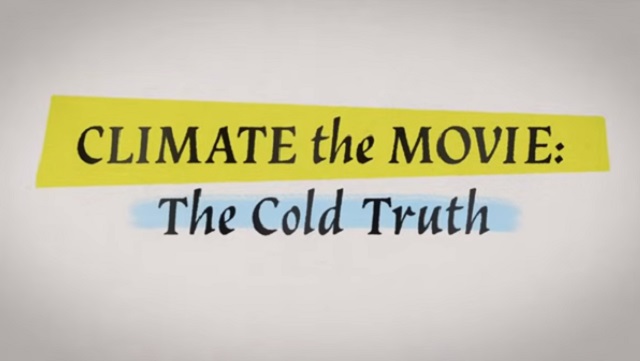Environment
New must-see documentary exposes climate alarm as an “invented scare”

From the Climate Intelligence Foundation (CLINTEL).
Founded in 2019 by emeritus professor of geophysics Guus Berkhout and science journalist Marcel Crok, CLINTEL‘s main objective is to generate knowledge and insight into the extent, nature, causes and consequences of climate change and the climate policy related to it.
From CLINTEL on YouTube
This film exposes the climate alarm as an invented scare without any basis in science. It shows that mainstream studies and official data do not support the claim that we are witnessing an increase in extreme weather events – hurricanes, droughts, heatwaves, wildfires and all the rest. It emphatically counters the claim that current temperatures and levels of atmospheric CO2 are unusually and worryingly high.
The film includes interviews with a number of very prominent scientists, including Professor Steven Koonin (author of ‘Unsettled’, a former provost and vice-president of Caltech), Professor Richard (Dick) Lindzen (formerly professor of meteorology at Harvard and MIT), Professor Will Happer (professor of physics at Princeton), Dr John Clauser (winner of the Nobel prize in Physics in 2022), Professor Nir Shaviv (Racah Institute of Physics), professor Ross McKitrick (University of Guelph), Willie Soon and several others.
The film was written and directed by the British filmmaker Martin Durkin and is the sequel of his excellent 2007 documentary The Great Global Warming Swindle. Tom Nelson, a podcaster who has been deeply examining climate debate issues for the better part of two decades, was the producer of the film.
Follow @ClimateTheMovie and @ClintelOrg for updates.
Climate Intelligence Foundation (CLINTEL) is an independent foundation that reports objectively on climate change and climate policy and aims to be a voice of reason in the often overheated climate debate. CLINTEL was founded in 2019 by emeritus professor of geophysics Guus Berkhout and science journalist Marcel Crok . CLINTEL’s main objective is to generate knowledge and insight into the extent, nature, causes and consequences of climate change and the climate policy related to it. CLINTEL also wants to participate in debates on climate science and policy, as well as in decision-making processes in this regard.
To this end:
- The foundation tries to communicate clearly and transparently to the general public what facts are available about climate change and climate policy and also where facts turn into assumptions and predictions.
- The foundation conducts and encourages a public debate on this matter and carries out investigative journalism work in this area.
- The foundation aims to function as an international meeting place for scientists with different views on climate change and climate policy.
- Will the foundation also conduct or finance scientific research in the field of climate change and climate policy?
- The foundation participates in decision-making procedures regarding the climate, climate communication and climate policy, in particular legislative and regulatory processes, but possibly also legal procedures regarding climate policy of governments, companies or other parties.
CLINTEL wants to take on the role of ‘climate watchdog’, both in the field of climate science and climate policy.
CLINTEL was made possible in part by a start-up donation from real estate entrepreneur Niek Sandmann. The foundation is very grateful to him for this. Several people have already indicated that they would also like to contribute financially to the foundation. This can also be done anonymously if desired. You can support us by becoming a Friend of CLINTEL or making a one-time donation .
The foundation strives for as few overhead costs as possible, so that almost all resources can be spent on investigative journalism, scientific research and public information. CLINTEL will work on an extensive national network of “friends” and “ambassadors”. To this end, meetings ( CLINTEL Chambers ) will be organized throughout the country . CLINTEL also has a youth organization, Young CLINTEL .
CLINTEL is located in Amsterdam and can be reached via [email protected].
Links
Channel details
| www.youtube.com/@clintel628 |
Environment
Rising Seas Not Resulting in Disappearing Islands

From Heartland Daily News
A spate of recent articles acknowledges a fact that Climate Realism has long discussed. Most island nations, rather than sinking beneath the waves as seas rise amid modest warming, as predicted by climate alarmists and island profiteers, are, in fact growing.
Writing for The Pipeline, Buck Throckmorton thoroughly debunks claims that recent collapses of houses built on the shores of barrier islands in North Carolina were caused by climate change:
[B]arrier islands … are impermanent deposits of sand, which reshape, move, merge, appear, and disappear due to tides, winds, and storms.
The movement of barrier islands is not due to rising sea levels, it is due to a naturally occurring force called “longshore drift.” Where there are man-made efforts to stabilize barrier islands with jetties and sea walls, this produces other impacts on currents that cause erosion in some waterfront areas and new sand deposits in others. Beach houses in the Outer Banks are not being lost due to rising sea levels, they are being lost due to shifting sands.
Throckmorton also pointed to the disappearance of Tucker’s Island, off the coast of New Jersey, which completely disappeared due to “long-shore drift,” not rising seas.
NOAA describes the impact of long-shore drift, thusly:
Longshore drift may also create or destroy entire barrier islands along a shoreline. A barrier island is a long offshore deposit of sand situated parallel to the coast. As longshore drifts deposit, remove, and redeposit sand, barrier islands constantly change.
Semi-permanent, shifting barrier islands are not the only types of islands not being destroyed by climate change-induced rising seas. Even The New York Times (NYT) was recently forced by reality to admit that coral atolls, long the poster child of rising seas claiming nations, have been expanding and adding land amidst the Earth’s slight recent warming.
As recently as April 2024, with a story titled “Why Time Is Running Out Across the Maldives’ Lovely Little Islands,“ the NYT was still pushing the lie that rising seas threaten dozens of island nations, consisting of hundreds of small coral atolls, with extinction. Reality forced the NYT to reverse itself in the space of just three months. The author of a late June article, “A Surprising Climate Find,” wrote:
Of late, though, scientists have begun telling a surprising new story about these islands. By comparing mid-20th century aerial photos with recent satellite images, they’ve been able to see how the islands have evolved over time. What they found is startling: Even though sea levels have risen, many islands haven’t shrunk. Most, in fact, have been stable. Some have even grown.
The problem with this narrative is that the fact of growing islands during the recent period of climate change is not new news. In fact, as my colleague Linnea Lueken noted in a recent piece, the study the NYT references was published in 2018, six years ago. It found 89 percent of islands in the Pacific and Indian Oceans increased in area or were stable, and only 11 percent showed any sign of contracting.
Indeed, geological understanding of coral atoll growth and demise is not newly discovered.
“Scientists have known for decades, if not more than a hundred years, that atoll islands uniquely change with changing sea levels,” Lueken points out. “Charles Darwin was the first to propose that reefs were many thousands of feet thick, and grow upwards towards the light. He was partially correct, though reality is more complicated than his theory.”
Repeated studies show that what is true of the Maldives, growth amid rising seas, is equally true of the islands that make up Tuvalu and Kiribati, and across the island chains of Micronesia. One well-cited study from 2015 reported that 40 percent of islands in the Pacific and Indian Oceans were stable, and another 40 percent had grown, in recent decades.
Oceans, oceans everywhere, and nowhere can be found the much-bemoaned decline in island nations hyped be climate hucksters with regularity. When even the NYT is forced to admit this truth, you know the climate alarm narrative is in trouble.
Sources: The Pipeline; The New York Times; Climate Realism
Business
Corporate Canada betrayed capitalism. Now it has been betrayed

From the Fraser Institute
By Bruce Pardy
The original Battlestar Galactica, a campy space opera, debuted on network television in 1978. Canadian actor John Colicos played the traitor Baltar, who helps robot Cylons ambush human civilization. After humans have been almost wiped out, Baltar is hauled before the Cylons’ Imperious Leader. “What of our bargain?!” Baltar demands. “My colony was to be spared!” The Leader says he has altered the bargain. “How can you change one side of a bargain?!” Baltar spits, not getting it. “When there is no other side,” the robot tells him, “You have missed the entire point of the war. There can be no survivors.” “Surely,” Baltar stammers, finally understanding, “you don’t mean me.”
Corporate Canada should know the feeling. After years of colluding with climate hysteria and betraying capitalism, Canadian companies have been dumped at the curb.
On June 20, Bill C-59 received Royal Assent. It’s a hodgepodge bill of humdrum provisions, hundreds of pages long, related to last year’s spring federal budget and fall economic statement. But buried in the stack are two sections that prohibit “greenwashing.” Businesses cannot claim that their products or practices help to protect against climate change or provide other environmental benefits unless they can prove the claims are true. The provisions amend the Competition Act and make climate and other environmental claims subject to the same regulatory regime as false advertising.
Companies and industry associations have taken down climate pledges and environmental commitments from their websites and social media. “Ottawa’s ban on ‘greenwashing’ has already put a chill on climate disclosure targets,” objected Deborah Yedlin, president and CEO of the Calgary Chamber of Commerce, in a commentary for CTV. It will affect the entire economy, she wrote, add bureaucratic burden, halt investment, and weigh on Canada’s sagging productivity. Corporate Canada has lost its climate bargain.
Over the course of decades, Western countries, but nowhere more than Canada, have undergone a cultural revolution. Accelerating climate activism, aggressive social justice ideology and managerial government have changed the landscape. Business elites, instead of defending capitalism, competition, open markets, the rule of law and other values of Western civilization, decided to switch rather than fight. To protect their own prosperity and influence, corporate leaders learned to speak the language and adopt the norms of progressive collectivism. They became cheerleaders for the new regime. Many came to believe in it themselves.
Companies took on new roles. The social responsibility of business became not merely to increase its profits, as Milton Friedman famously insisted, but to serve as social welfare agencies. They were not just to obey the law and deliver products and services that people wanted to buy, but to pursue social and environmental causes. They would serve the interests not just of their shareholders but their “stakeholders,” as “Environmental, Social and Governance” (ESG) models demanded.
In their marketing and rhetoric, they embraced climate action, corporate social responsibility, social licence, “equity, diversity and inclusion” (EDI) and social justice. They promoted the United Nations Sustainable Development Goals (SDGs), which are a blueprint for socialist managerialism. The Business Council of Canada endorsed carbon pricing and Canada’s climate plans. Major oil companies promoted net zero and repeated the kinds of claims that governments themselves made: that climate action in Canada helps to prevent the climate from changing.
Such claims are patently false. Even if you believe in anthropogenic climate change, if your country doesn’t contribute much to the problem, cutting its contribution isn’t a solution. Bringing Canadian carbon emissions to zero would make no measurable difference to anything. Countries that together produce far and away most of the emissions on Earth have no intention of changing their paths. And who can blame them? If I were them, I would do the same.
Canada excels at climate boondoggles. Carbon taxes are just more money for government coffers that do not necessarily reduce emissions, if that actually mattered.
Wind and solar power, a lucrative source of government largesse that some businesses have adeptly saddled up to, don’t replace fossil fuels. Carbon capture and storage, perhaps the most pathetic pretend of them all, is a breathtakingly expensive symbolic gesture that cannot be applied at scale. The Paris accord and its net zero aspirations are climate fairy tales.
Canadian business leaders would never say any of this. That was the deal: pay homage to the climate gods, and you can be on the team. But now they can’t.
Progressive statism has never been about the climate, or transgenderism, or whatever the cause du jour. The target has always been Western values and principles. Free enterprise is anathema to its aspirations, and as it turns out, so is prosperity itself. Canadian companies have betrayed the economic principles of their own society. How does government change one side of a bargain? When there is no other side.
The Canadian business community still does not understand the point of the revolution. There can be no survivors. Surely, they sputter, you don’t mean us.
Author:
-

 Brownstone Institute1 day ago
Brownstone Institute1 day agoThe Media Refuses to Accept Covid Reality
-

 Alberta1 day ago
Alberta1 day ago‘Fireworks’ As Defence Opens Case In Coutts Two Trial
-

 National1 day ago
National1 day agoLiberals offer no response as Conservative MP calls Trudeau a ‘liar’ for an hour straight
-

 COVID-191 day ago
COVID-191 day agoLeaked documents: German gov’t lied about shots preventing COVID, knew lockdowns did more harm than good
-

 Business1 day ago
Business1 day agoFederal government seems committed to killing investment in Canada
-

 International1 day ago
International1 day agoSwitzerland’s new portable suicide ‘pod’ set to claim its first life ‘soon’
-

 Business1 day ago
Business1 day agoEstonia’s solution to Canada’s stagnating economic growth
-

 Economy1 day ago
Economy1 day agoKamala Harris’ Energy Policy Catalog Is Full Of Whoppers






